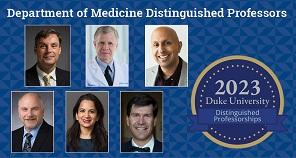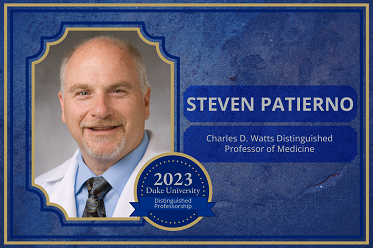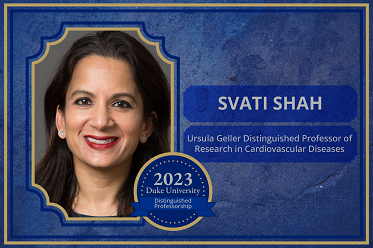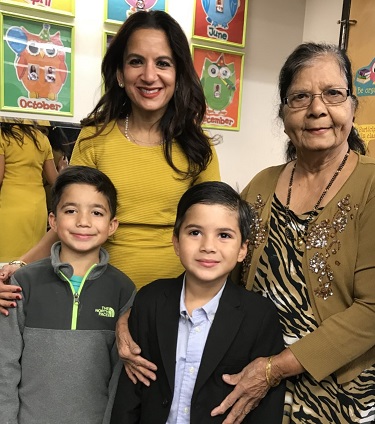
Duke University has awarded Distinguished Professorships to 44 faculty members, six from the Department of Medicine—Professor Daniel James George, MD, Medical Oncology; Professor Christopher Bull Granger, MD, Cardiology; Professor Rana K. Gupta, PhD, Endocrinology, Metabolism and Nutrition; Professor Steven Patierno, PhD, Medical Oncology; Professor Svati H. Shah, MD, MHS; and Professor Christopher Wildrick Woods, MD, Infectious Diseases.
Distinguished Professorships recognize faculty scholars who are well-established members of the Duke academic community who have also achieved distinction as creative scholars in their field or in their ability to transcend disciplines.
Over the coming weeks, join us in recognizing these Distinguished Professors through our Distinguished Professor Spotlight.
This week, we feature Drs. Steven Patierno and Svati Shah.
Professor, Steven Patierno, PhD, Medical Oncology
Charles D. Watts Distinguished Professor of Medicine
Tell us about your clinical, academic, or research interest and why you are passionate about this topic or area of focus.

I conduct translational cancer research in cancer control and molecular oncology. My current research focuses on the multi-level causes of cancer disparities and interventions for achieving cancer health equity including the ancestry-related genomics of cancer disparities, experimental therapeutics, and healthcare delivery research focused on patient navigation and cancer screening. I created and implemented the first model of longitudinal patient navigation across the entire cancer care continuum, which is now the national norm.
I have also addressed cancer disparities through innovation in community engagement, mHealth and policy. My laboratory, co-led at Duke by Drs. Jennifer Freedman, PhD, and Daniel George, MD, pioneered the discovery of ancestry-related differential RNA splicing in cancers from patients of different racial ancestries. Some of these RNA splice variants drive increased tumor aggressiveness and correlate with worse responses to therapy and worse survival. Several of these splice variants are also druggable and my laboratory team is developing novel precision therapeutic approaches to target RNA splicing.
Who has influenced you the most in life and why?
The person who has influenced me the most in my life is my wife, Kim Patierno, who is a nurse. Her love and unwavering support have allowed me to dream big and pursue those dreams. Her passion for taking care of patients always pushed me to focus my research on important questions that impacts patients in the near term.
The person who impacted the trajectory of my career the most is Dr. Harold Freeman, the father of the patient navigation. As an African American breast cancer surgeon in Harlem, New York, he conceived of patient navigation as an intervention to mitigate cancer disparities in underserved communities. I was one of the earliest adopters of patient navigation and the first to bring it to the inner city of Washington, D.C. Despite his being 25 years older than I, we became very close friends, and we spent many hours together brainstorming ways to provide quality cancer care to minoritized, marginalized and poor communities. More than anyone else, his influence on my life caused me to refocus my entire academic career on mitigating cancer disparities and achieving cancer health equity.
Thus, it is particularly significant to me that this Distinguished Professorship is named for Dr. Charles D. Watts, the first African American physician to be certified as a surgeon in North Carolina. He was a staunch advocate for quality health care for the poor over his entire 50-year career, which began at Lincoln Hospital, originally a segregated hospital that eventually became Lincoln Community Health Center.
What do you view as the biggest challenge to the field of medicine going forward and how can we address it?
Achieving health equity is one of the major challenges to the field of medicine. Addressing this highly complex, multi-level problem requires purposeful intentionality to address each of the major drivers of health inequity: societal level (removing structural racism and implicit bias from the healthcare system), social and neighborhood level (mitigating educational, economic and housing inequities and food insecurity); individual level (improving access to quality care and healthy lifestyle behaviors); biological level (practicing biomarker-driven precision medicine that is sensitive to race and ethnicity and NOT what is sometimes called “race-based medicine”); and finally, and improving research participation including clinical trials.
Professor Svati H. Shah, MD, MHS, Cardiology
Ursula Geller Distinguished Professor of Research in Cardiovascular Diseases
Tell us about your clinical, academic, or research interest and why you are passionate about this topic or area of focus.

I am a physician-scientist and a cardiologist. I have a translational research laboratory within the Duke Molecular Physiology Institute where I study the genetic and molecular determinants of cardiometabolic diseases. I am lucky to get to work with a multi-disciplinary team in my lab including biostatisticians, bioinformaticians and genetics experts. Using large human cohorts and clinical trials biorepositories, we have identified key metabolic pathways and related biomarkers that underlie cardiometabolic disease risk and we study monogenic cardiovascular disorders. I am also fortunate to be the Director of the Duke-Kannapolis clinical research site which conducts clinically oriented, community-engaged translational research.
I feel incredibly lucky to be able to do research but to also take care of patients. I founded and direct the Duke Adult Cardiovascular Genetics Clinic where we care for patients with monogenic cardiovascular disorders. I am passionate about the use of genetics to identify undiagnosed disease and improve patient care; while we think of these as rare diseases, in aggregate in fact they are not that rare and frequently go undiagnosed and untreated. My passion for this field started as a cardiology fellow at Duke University when I was seeing very young patients having heart attacks, and was further amplified after my son was hospitalized with a gastrointestinal bleed. After a several month diagnostic odyssey, both my sons were diagnosed with a genetic bleeding disorder. I am excited to lead a new genomic medicine program within the Duke School of Medicine where we will be expanding the use of genetics for undiagnosed diseases with the ultimate goal of improving patient care.

Who has influenced you the most in life and why?
My family has influenced me the most. My parents are immigrants from India; they worked tirelessly to escape the poverty in which they were raised. My mother was a single mother who struggled to raise my sister and me, but she never gave up and even while trying to put food on the table, she always pushed to improve herself. She inspires me to work hard and pursue excellence in everything I do, both professionally and personally.